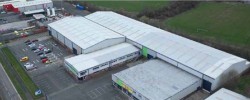Although the housing crisis has been brewing for some time, not enough consideration has been given to the potential of offsite construction to turn the trend around. Project Etopia was founded in 2015 with the ambition of building affordable homes with technological and environmental specifications that should come as standard in all newbuilds. The landscape has not shifted considerably since then, as the lack of affordable homes on the market has continued to leave many locked out in the cold, knowing their dream of home ownership will remain just that. But change is slowly happening. The government has started to recognise the potential of modular projects, with Homes England providing cash to such schemes and Chancellor, Philip Hammond indicating his support for offsite methods of construction.
The traditional method of building homes is a dinosaur — people are just yet to have their eyes opened to that fact. Project Etopia aims to be at the forefront of spearheading this switch to offsite construction. Etopia's houses are constructed using a panelised system, with the panels delivered to site for assembly. Delivering panels, rather than complete homes, has made it easier to adapt designs if anything unexpected crops up in the latter stages of the build. It also reduces our transportation costs and drastically reduces CO2 emissions. Prime Minister Theresa May's move to boost council house building by scrapping borrowing caps that have limited how much they can build, means authorities are increasingly likely to commission their own projects.
However, councils still have spending pressures and, even if they are able to borrow more, they will still be keen to show value for money and pay loans off sooner rather than later. Importantly, they need to be sure they can achieve a high-quality project that is deliverable quickly and costeffective. Modular housing delivers in all three areas. And there has never been a more pressing need for a transformation in the way housebuilding is conducted.
Any authority that remains glued to traditional bricks and mortar builds condemn themselves to an average 25-week build time. Compare that to four weeks for an Etopia modular home and it's abundantly clear that if politicians are truly committed to turning the housebuilding landscape on its head, they need to look to modular. For example, the superstructures of our first four houses in Corby, Northamptonshire, were up in just 34 days or 8.5 days per unit and our unit in Namibia has been constructed in just eight hours. Much of the world has already embraced offsite construction, with Sweden leading the way with more than 80% of new homes using some kind of modular technique.
While the choice of materials and methods vary greatly around the world, the fast building time is an attractive advantage as countries battle similar housing shortages. Protecting the environment is another area where modular housing sets a benchmark far apart from its brick and mortar counterparts. Building projects do not happen in isolation, and they have an impact on the country's carbon levels. The government's advisory body, the Committee on Climate Change, has recommended the UK sets a legally binding contract to cut greenhouse gas emissions to zero by 2050.
Modular housing can lead the way in meeting this goal within the construction industry, by installing solar panels as standard and embracing other renewable technologies — not to mention the fact that modular housing often has technological advantages over brick properties. For example, our panels have better thermal efficiency, with a superior U-value of 0.13 compared to 0.16 for a typical well-insulated wall in a new build brick property. There is a further 'green' angle to offsite construction. Housebuilding traditionally has had an environmental cost but this is dramatically reduced by using offsite methods, as projects of the same scale can be completed in a matter of months. This means there is less noise pollution and HGV traffic, and a reduction in all the CO2 associated with fleets of trucks ferrying materials to and from the development.
Emissions are reduced 75% with our system against conventional builds, simply through the materials used. As we move forward, offsite construction is poised to grow rapidly as its benefits and quality are proved. The growth of modular will outpace traditional bricks and mortar in the coming years and will come to be the primary building method in the next decade. There is no reason why offsite construction cannot match the 300,000-houses-a-year target the government has set. Bricks and mortar has fallen at this first hurdle — modular can jump it and then some.
As for Project Etopia, we put no ceiling on our own ambitions. Our first goal is to build 21,500 homes a year in the UK by 2025, providing high-quality ecofriendly homes with smart technology for tens of thousands of people. Although the housing crisis looms large in the UK, the situation is just as bleak around the world. Our first international pilot project has been completed in Namibia, and it demonstrates how British manufacturing can play a role in building the world's homes. We seek to raise standards abroad just as we are at home. It is not enough to merely provide a place to live. A home must be high-quality, built to the highest design specifications, and constructed with the environment in mind. Homes of the future do not need to be costly — for the owner or for the environment — and change is coming sooner than you think.
For more information visit: www.projectetopia.com









